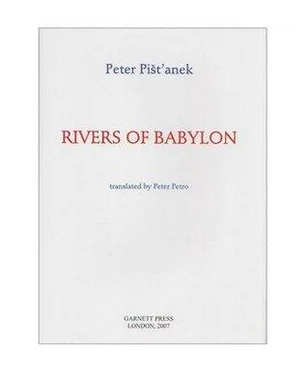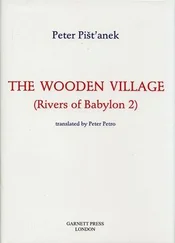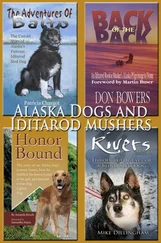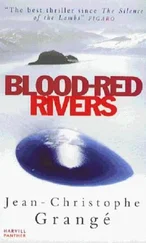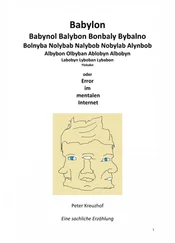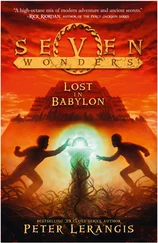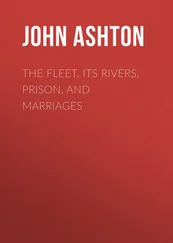“Never mind,” says Rácz, “I’m coming with you.”
They drive through the dark village. Rácz says nothing. They reach the tavern and get out. Rácz just gives the orders. Ďula carries the cases and provisions. Then Rácz pays from his giant wallet. The men in the tavern watch in silent admiration.
On the way back, along the unlit, slippery road, they can see in the far distance the silhouette of a warmly dressed man on horseback.
“That’s Feri Bartaloš!” Rácz says. “Step on it!” he orders Ďula and impatiently leans forward. Ďula obeys. Soon they catch up with the rider. Bartaloš’s mighty horse rides at a gentle canter, taking proud Feri home. Feri Bartaloš is so well wrapped up that he doesn’t notice anything around him. “Let’s push him off the road!” Rácz suggests vindictively.
“But, boss…” Ďula tries to object.
“What do you mean ‘but’?” Rácz asks instantly with menacing animation. “Don’t give me ‘but’!” He clenches his fist as always when someone tries to resist him.
Ďula shrugs uncertainly, as a sign of capitulation. He won’t take responsibility, but he changes gear and veers to the side of the road, pushing the rider into a ditch. Then something hits the metal side of the minibus: both rider and horse vanish in a cloud of snow. Rácz looks round. The sight of Feri Bartaloš lying motionless with four huge hooves helplessly sticking up in the air fills Rácz with triumph. He can’t take his eye off the scene. He turns his head forward and looks at the road surface only when his neck starts to hurt.
The windows of the Kišš house light up the night. Curious onlookers from the village stare through the windows and step on each other’s toes. They draw back respectfully as the minibus drives up. Kišš brings a small barrel of pear brandy out onto the porch for them.
Inside, the corks from the sparkling wine soon start hitting the ceiling. Others sip mulled wine. The tables are filled with plates of steaming pork-belly soup and meat.
“Try the champagne, Eržika,” says Rácz, lighting up a Marlboro. “It’ll refresh you,” he adds. He himself has drunk plenty, as he had to celebrate his victory over proud Feri Bartaloš and so, quickly, he’s downed a few glasses of champagne in quick succession. Now he finds Eržika desirable. She is young, well built, with a round face. In her place Rácz imagines Silvia, made-up, bleached, and overdressed, smelling of cigarette smoke with breasts the size of a five-crown coin and with a crotch the width of a hand between her lanky, skinny legs. He suddenly sees things clearly. He controls a sudden urge to grab her full thigh, visible under her full-length apron. Compared to Eržika, Silvia looks like a spider in a privy, Rácz concludes. The same goes for the other scrawny bitches in the Ambassador Cabaret bar: Edita, Wanda the Trucker, Anča-Jožo, and even Dripsy Eve. Disgusting! Only now, at home, among his own people can Rácz breathe freely!
“And you, Ďula,” he turns to his driver. “Why aren’t you having fun?” Ďula is sitting drinking mineral water. Rácz gets up and gives orders. Rácz orders Ďula to drink. They’re not driving anywhere today. Tomorrow. Later. Afterwards. Rácz is celebrating his engagement. Yes, engagement. He’s going to be engaged. Ďula meekly agrees to a glass of champagne and downs it. Eržika, too, finishes her glass. Rácz immediately refills it.
“Tell me, how’s life?” Rácz asks Eržika. He likes her. He’s fallen in love with her and fancies her.
“Well, mixed,” answers Eržika, her speech blurred, and laughs. “Nothing but work,” she adds. Her father makes her work all the time. The old women in the butcher’s shop are always getting at her, nothing is good enough for them. She’d rather go to the city and work in a meat-processing factory. She’d live in a dormitory. She’d come home for weekends. “It’s better in the city. There’s entertainment, discos, shops. What’s here? Nothing.”
Rácz disagrees. Rácz is a city man, you could say. He’s been living quite some time, in fact, right in the city centre. He knows very well that there’s nothing there like what Eržika dreams of. If he could, Rácz would come straight back to his native village. Life is good here. In the city there’s no life! But Rácz has to stay there for now. Business. A lot of people depend on Rácz.
“And do you like me a bit?” Rácz asks Eržika.
“Me?” Eržika asks. Why not? None of her friends have boyfriends like him, with a car and a driver. Eržika is proud of him.
Rácz smiles, contented and proud. He pours another glass of champagne and downs it. A driver? That’s not just a driver; he’s a servant, too! To prove it, Rácz orders Ďula to do his trick: to drink a litre of water non-stop and then crawl under the table with a pork chop between his teeth.
They all laugh and clap. Rácz can’t take his eyes off Eržika. How shy, young and fresh she is!
By now the guests are drunk. Some at table begin to sing mournful, drawn-out songs.
Rácz puts an arm round Eržika. He pours her another drink. He swallows a few times. His ears are buzzing. The blood has gone to his head. He’s excited. “If you really like me,” he says half-choked, “you’ll come to the barn with me right now.” Rácz takes fright: he has a feeling that everyone around has heard what he said. But they’re noisily having fun. Someone has vomited on the table.
“Why the barn?” Eržika asks, “and then what?”
Rácz’s broad, simple face has changed. His eyes are popping with passion and his nostrils flare like a bull’s. His jaw shakes. He trembles all over. He’s sure he’s never felt this way before. Not even Silvia could unleash such a hurricane of feelings in him. He expects it’s because he’s never had much time for champagne before. But that doesn’t matter. Rácz knows that this is it! The other affair meant nothing. He loves Eržika. It’s all coming back to him. After all, he went to the city for the sake of Kišš’s daughter!
“Why the barn?” Eržika asks.
Rácz gesticulates. “You’ll show me there how much you like me,” he says. “That’s how it’s done in the city. If a girl loves someone, she has to prove it to him first.” Rácz is getting the feeling that she loves him only for his money. Yes, Rácz has got money. Why shouldn’t he? But first of all, he’s a man. And what does a man need? He needs proof of love! Rácz drinks a glass of champagne and forces Eržika to do the same. He fills their glasses and proposes a toast: “To us!”
At the other end of the table, Kišš clinks his glass and gets up. He starts a speech. Kišš is, you can say, loaded. A butcher can make good money, people will eat anything. Young Rácz would like to marry his daughter, his only daughter. Rácz is a smart boy. He’s proved that he inherited all the good qualities of his parents who passed away so tragically. He left for the city and became rich amazingly quickly. But you have to admit that if it weren’t for Kišš, Rácz would not be where he is today! This morning Rácz gave him his horse. Now Kišš will give him his daughter. Yes, first thing tomorrow, they’ll go to the priest to arrange the marriage banns.
Kišš, all red in the face, finishes and sits down. Now they all expect Rácz to say something. But Rácz just sits there obstinately mute; he’s not a talker. He’d rather go and hide somewhere.
Uncle Endre saves the situation. He gets up and makes a speech. He assures Kišš that Rácz will be an obedient son-in-law. At home, he got slapped for the slightest thing. His parents choked to death on money. Endre had his share when the inheritance was divided up, while Rácz was on the way to the funeral. There wasn’t that much left. It was just a smidgen compared to what Rácz now has at his disposal. Such is justice: they all helped themselves to money that was not theirs and which — and Endre has to admit frankly — they robbed young Rácz of. They shared out someone else’s inheritance. What a shameful act! However, on the other hand, would Rácz have been able to get so far if he’d inherited the money? Never! He’d have been an averagely well-off peasant, and Kišš would have given him Eržika in marriage there and then, and they’d all have lived happily ever after. A sort of justice arranged things in such a way that a shameful act eventually turned out to be a good deed, even a favour. Otherwise, Rácz would have never become such a wealthy man, a nabob, a tycoon. Uncle Endre now paused for a while. And therefore, he went on, looking Rácz in the face, he asks in the name of Rácz’s aunts and uncles for forgiveness for making him… such a rich man. At the same time, he proposes a toast to the health of the young couple.
Читать дальше
